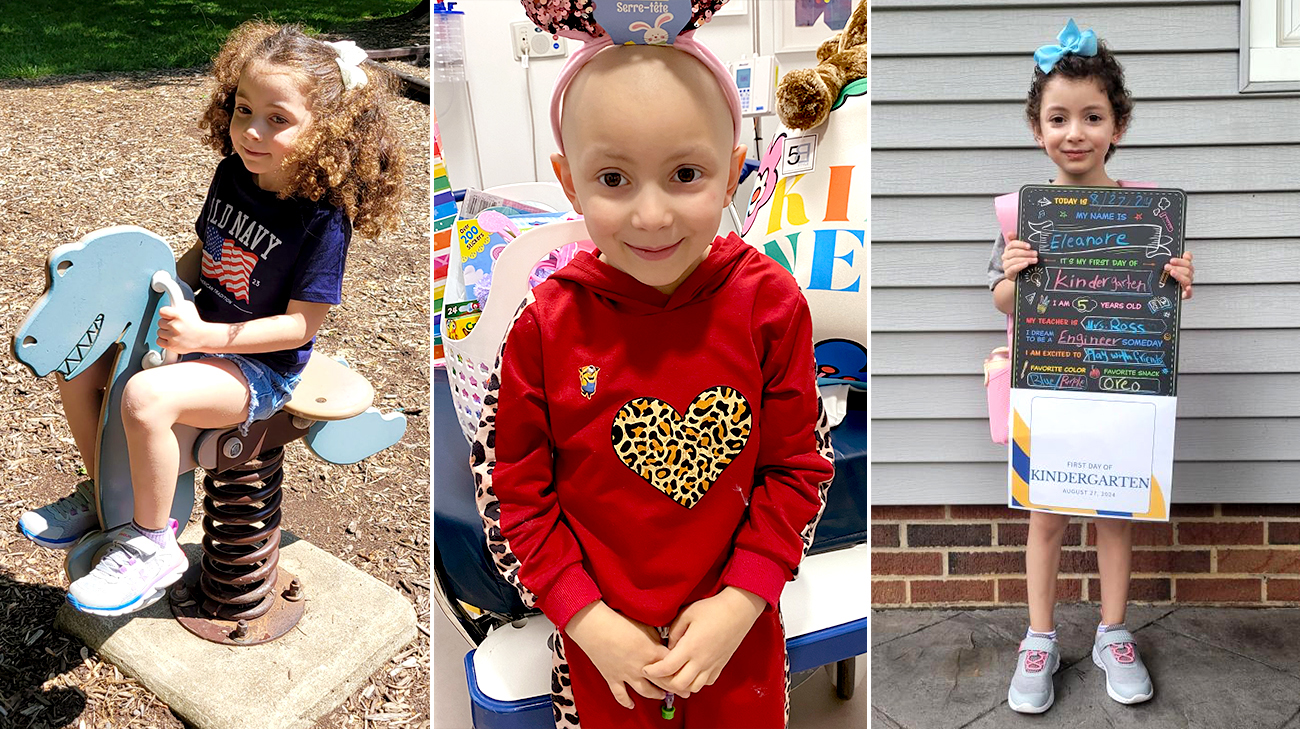
Eleanore Yousef loves meeting new people, and she greets everyone new with a big smile. The 5 year old’s positivity is infectious, and it’s something she didn’t let waver even during her intensive treatments for a rare cancer.
“Eleanore is such a bright light and always has a smile on her face even when she doesn't feel well. She’s the perfect example of the absolute resilience children must have when they’re facing something as challenging as cancer,” says Stacey Zahler, DO, Eleanore’s pediatric hematologist oncologist at Cleveland Clinic Children’s.
Eleanore’s health journey started at 4 years old when she began experiencing abdominal pain. Her mom, Josephine Dayoub, says her primary care doctor initially thought it could be constipation and gave her medication. However, Eleanore’s symptoms worsened over time.
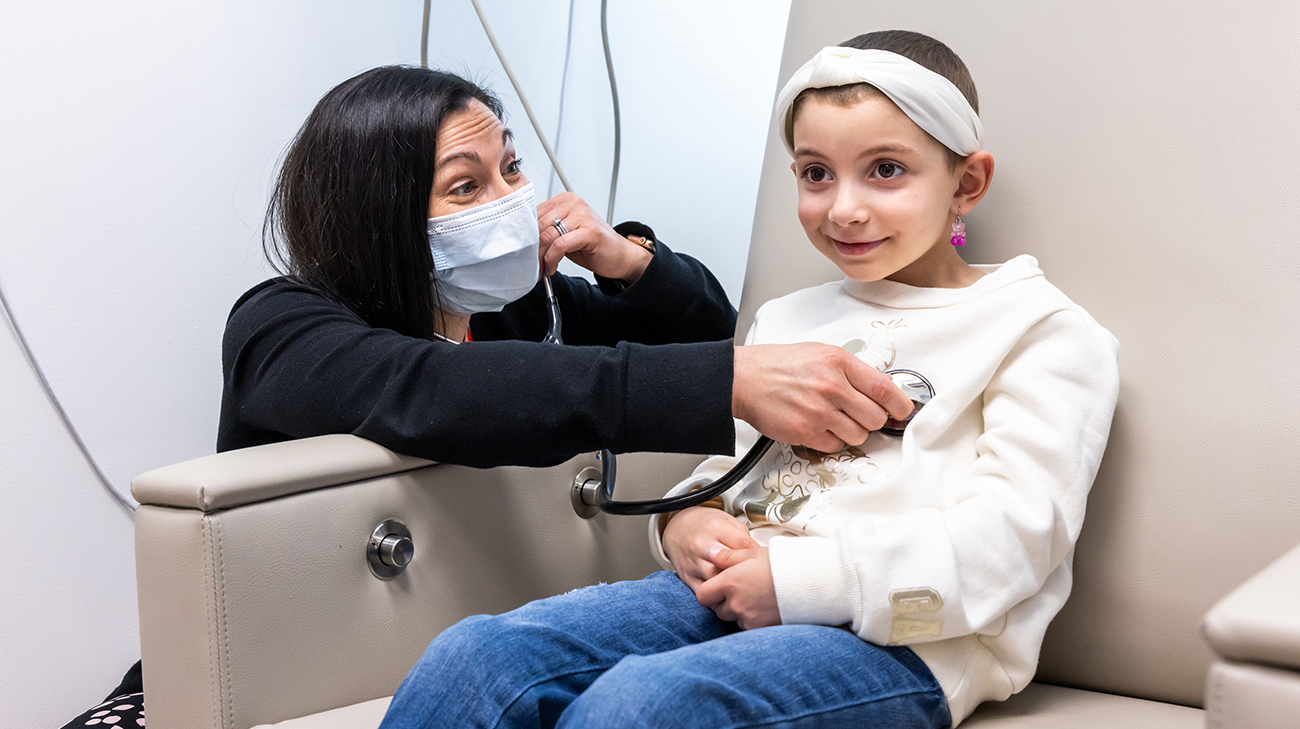
Eleanore with Dr. Stacey Zahler at a follow-up appointment after being diagnosed with neuroblastoma in 2023. (Courtesy: Cleveland Clinic)
“I was getting Eleanore ready to go to daycare one day, and she told me she couldn’t get up. This was weird for Eleanore since she's always awake and ready to go in the morning,” says Josephine. “Then she started crying, ‘My belly, my belly.’”
After further evaluation, a CT scan revealed Eleanore had a tumor in her chest – it was pressing against her stomach and other organs, causing pain. Doctors ultimately diagnosed her with stage M neuroblastoma, a type of pediatric cancer that develops in the nervous system. Stage M means the cancer cells have spread to other parts of the body.
“I was scared when I first found out and started searching to see what neuroblastoma was, its survival rate and available treatment. But the doctors reassured me and explained every step we were about to go through,” says Josephine.
Since Eleanore had high-risk neuroblastoma, she underwent a rigorous treatment plan that included chemotherapy, surgery to remove her tumor, two stem cell transplants, radiation and immunotherapy.
“I describe the therapy Eleanore endured as the kitchen sink of solid tumor therapy because she’s had to have so much treatment to ensure success. There are risks of significant complications when you give this intensive treatment, but thankfully, she tolerated therapy relatively well,” says Dr. Zahler.
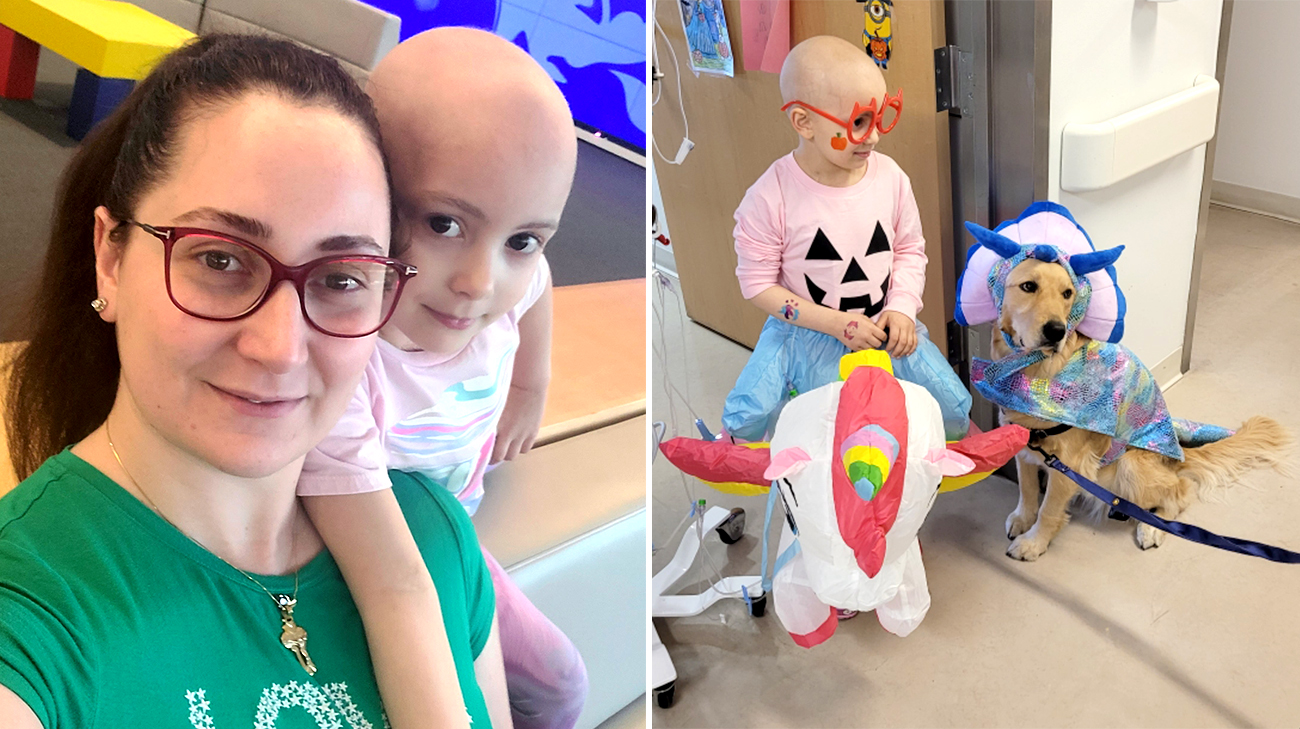
Eleanore’s family, including her mom, Josephine, was by her side throughout her treatments. Josephine says Eleanore enjoyed all the activities Cleveland Clinic Children’s offered throughout her time there. (Courtesy: Josephine Dayoub)
It is also noteworthy Eleanore received her radiation treatments without anesthesia as younger children typically require it to remain still during the process. Her radiation oncologist Erin Murphy, MD, explains that’s because radiation has to be delivered in a very precise manner, so they’re able to treat the targeted area without impacting other parts of the body.
“We used intensity-modulated radiation therapy, which means we can carve and shape the beams of radiation away from more sensitive structures,” says Dr. Murphy.
Since Eleanore had already spent significant time in the hospital for her treatments, Josephine practiced with her to remain still without anesthesia, so she’d be able to promptly leave after each round of radiation. Dr. Murphy says Cleveland Clinic’s main campus in Cleveland, Ohio, also has a system that allows kids to watch a TV show or video to keep them distracted and at ease during radiation treatments.
“We can project anything on the screen for them to watch during their treatment. With Eleanore, we practiced – telling her she needed to lie really still while the show was on,” says Dr. Murphy. “She was able to undergo 12 radiation treatments without anesthesia, which speaks a lot to the support of her family as well as the support and care she had already received at Cleveland Clinic Children’s before coming to radiation.”
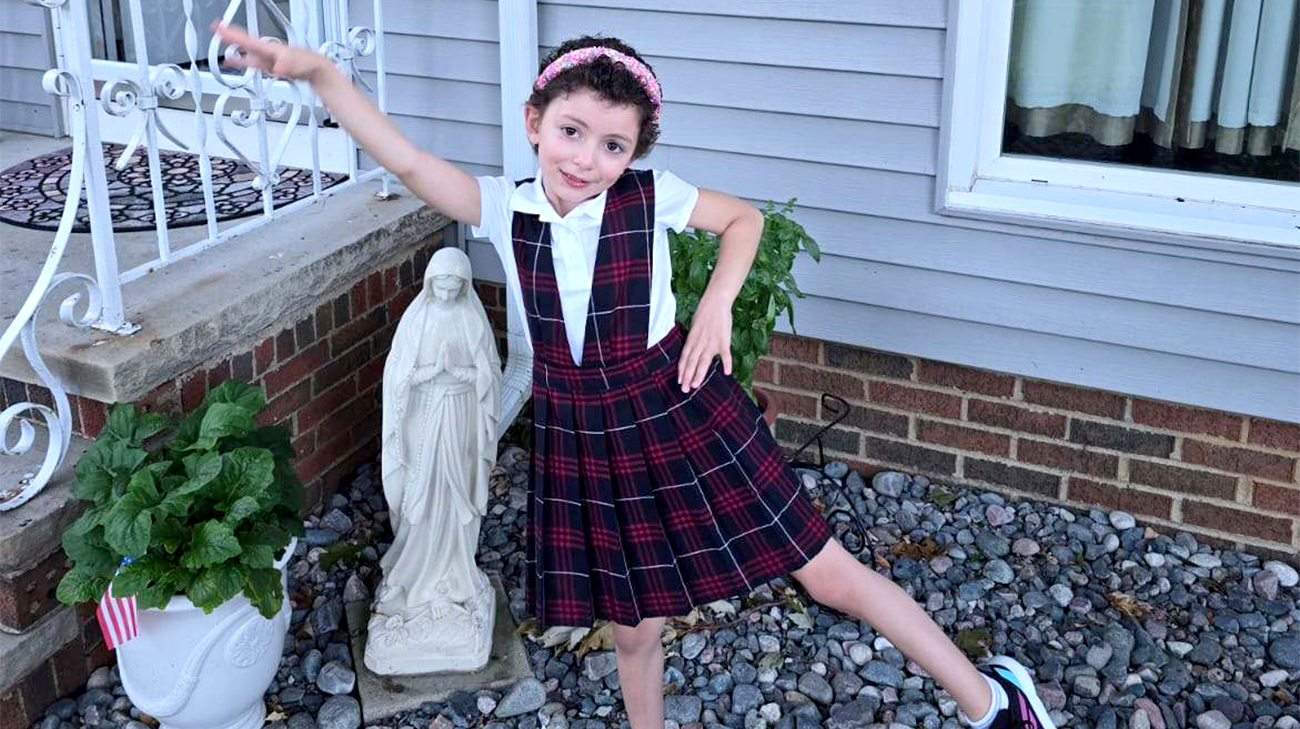
Following months of treatment, Eleanore was able to start kindergarten in August 2024. (Courtesy: Josephine Dayoub)
After being diagnosed with neuroblastoma in 2023 and completing her treatment, Eleanore’s follow-up scans in September 2024 show she’s in complete remission. Moving forward, Dr. Zahler says Eleanore will be closely monitored since high-risk pediatric neuroblastoma has up to a 50% estimated risk of recurrence. She will also be administered an oral maintenance therapy called difluoromethylornithine (DFMO), in order to prevent a recurrence.
“In the clinical trials using DFMO, five-year event-free survival rates were more than 80% for patients who were in complete remission at the end of their conventional therapy and then received two years of maintenance DFMO therapy. This is a significant improvement,” exclaims Dr. Zahler.
Along with efforts to prevent cancer recurrence, Dr. Zahler says there’s ongoing research regarding ways to curb and manage the potential late effects of neuroblastoma and its treatment. “Because of the intense treatment patients with high-risk neuroblastoma must go through, they may encounter different health issues down the road. We need to keep an eye on these patients and make sure any late effects are addressed,” says Dr. Zahler.
As for Eleanore, she’s looking forward to meeting new friends at school and spending her free time coloring and doing different crafts. Josephine says she’s thankful for the art and music therapy offered at Cleveland Clinic Children’s because it helped Eleanore keep her creative spark. Eleanore bonded with her art and music therapists as well as others on her care team.
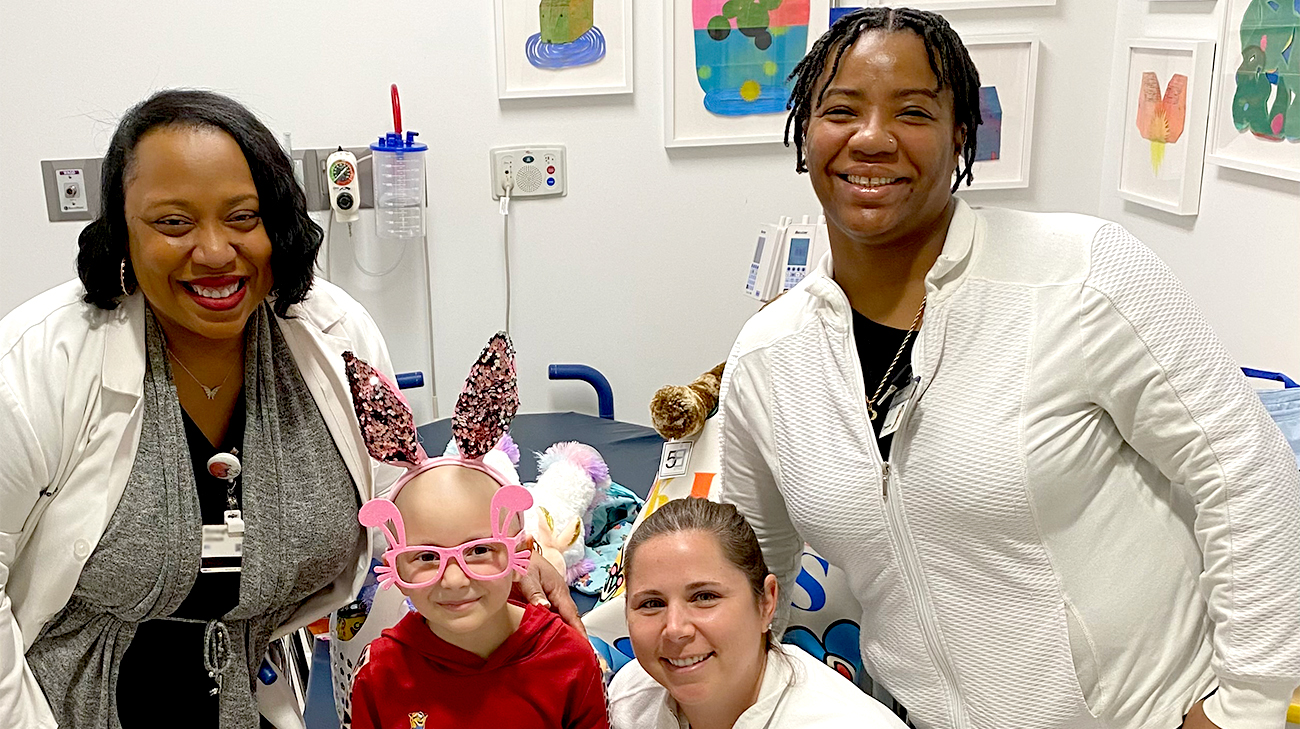
Eleanore became close with the caregivers she encountered throughout her treatments and looked forward to seeing them at follow-up appointments. (Courtesy: Cleveland Clinic)
“At home, Eleanore was always asking when we were going to come back to the hospital because she had made friends with all the doctors and nurses. Everyone was very friendly and treated us as family,” says Josephine.
Dr. Zahler adds, “It's been a complete joy and privilege to care for Eleanore. She's just a spunky, smiling spark of energy who always makes our day.”
After going through this experience, Josephine stresses the importance of finding the right care team and hopes sharing her daughter’s story can help others facing a similar situation.
“It may be hard in the beginning when everything seems dark, but trust the doctors and focus on how you can help and support your child through this,” says Josephine.
Related Institutes: Cleveland Clinic Children's

